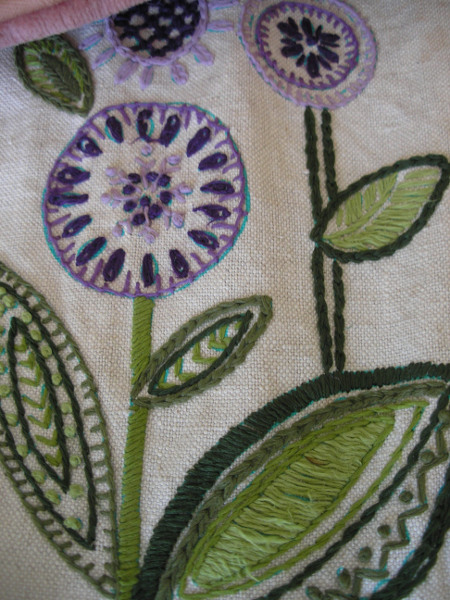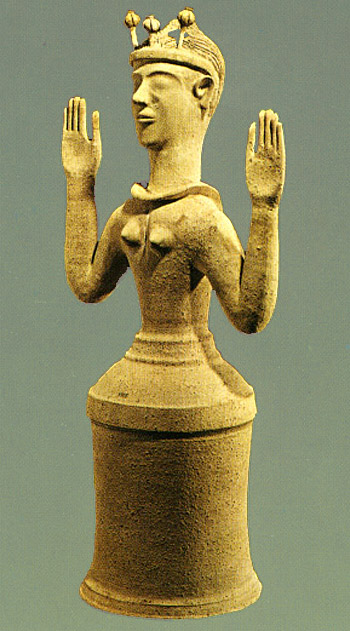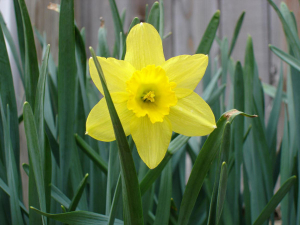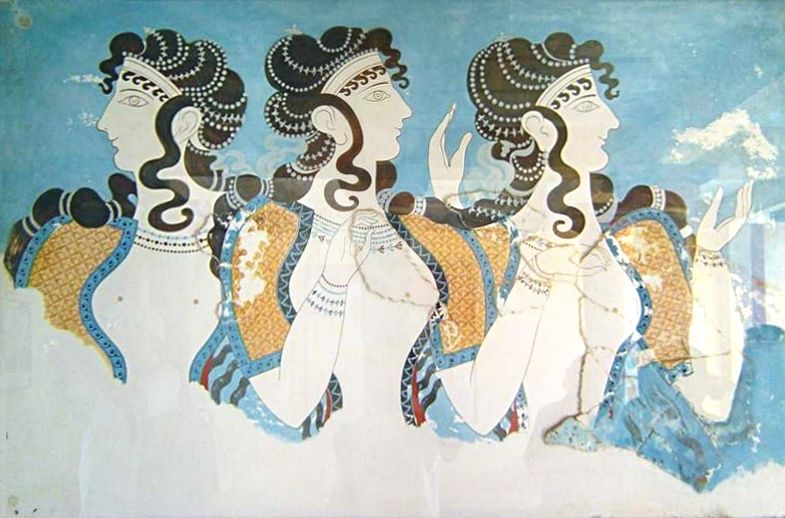Today, as I begin to write this post, is the anniversary of my mother’s death. She died in palliative care at St. Michael’s Hospital in Toronto on February 18, 1995 at the age of 67. Mum was named Wilhelmina by her parents Mary Ann (Mayme) and Frank Dobberman in North Bay, Ontario and came to be known as Billie.
Mum married three times including my father Bob Moore when she was 18. Their marriage didn’t last very long, four years I think, before she left North Bay to carve out a life for herself.

Detail from bell pull
Mum’s spirit continues to be with me. I still write poems about her, remember her many gifts to me and my children, and expressions she used that she would have learned from her mother make their way into conversations. Sarah and I still use her cutlery every day (wow that’s a long time) and her crewel work hangs on the wall. The image to the left is a detail of a bell pull done in crewel work.
In the fall of 1995, the year Mum died, I went on a goddess pilgrimage to the Greek island of Crete led by Carol Christ. I had read Carol’s books and was intrigued by the idea of travelling in a circle of women; taking part in rituals to celebrate women; and learning about the ancient earth-based cultures that worshipped a Mother Goddess. Carol, known as Karolina during our travels, wrote Odyssey with the Goddess: A Spiritual Quest in Crete which came out in 1995.
We found the goddess in trees and caves, mountains and ocean, in the stories of my fellow pilgrims (there were thirteen of us), and in the various physical forms the people of long ago created with their own hands. The pilgrimage turned out to be a healing journey that led to me offering women’s writing circles in my Toronto living room. I found hope in knowing there had been peaceful communities in the past where women were honoured and revered. I knew it would be possible to recreate that way of life again.
The first archaeological site we visited was Knossos, near the modern city of Heraklion where Carol Christ now lives. Parts of it have been reconstructed since 1375 bce. Archaeologist Sir Arthur Evans gave the name Minoan to the culture of the early people after the legendary King Minos. The “Ladies in Blue” fresco pictured above was found at Knossos and reproduced. This means that artists filled in the blanks, so to speak, using the small fragments that were available to them as guides. It’s a modern-day depiction as is the interpretation of Knossos as a palace with a king and queen.
 I have several of Carol Christ’s books including those written about pilgrimages to Crete, as well as glossy books about the various archaeological sites we visited including Malia and Gournia. I have photo albums and a few goddess reproductions including the Poppy Goddess. The original is made of terracotta and was found in a shrine excavated at Gazi on the western outskirts of Herakleion. I’m not ready to let any of these things go!
I have several of Carol Christ’s books including those written about pilgrimages to Crete, as well as glossy books about the various archaeological sites we visited including Malia and Gournia. I have photo albums and a few goddess reproductions including the Poppy Goddess. The original is made of terracotta and was found in a shrine excavated at Gazi on the western outskirts of Herakleion. I’m not ready to let any of these things go!
I’ve been looking at the various books to remind myself of the wonders of that journey to Crete. In recent newsletters, Carol Christ has said she has been undergoing chemotherapy treatments on the island of Crete. She will have surgery for her cancer soon. I wish her well.
In my effort to start paring down belongings this year I wanted to start with something simple which isn’t photographs and won’t be these books about Crete. I went to the bottom drawer of the living room cabinets. These are walnut cabinets that have been in Sarah’s family for many decades. Among the framed photos I had in the bottom drawer were pictures I took in Crete. They were on my wall in my Toronto apartment but there’s no room on any walls here in our Nanaimo home.
I’m appreciating the memory of the blue door that caught my eye as there are many buildings on the Greek islands that are white with blue shutters and/or doors. The vegetables in the market in Herakleion on the island of Crete looked so enticing. That’s not what you get though when you want to buy some. The beautiful ones are for display, the more misshapen ones are for purchase and they’re kept behind the display. The third framed photo shows stacks of unpainted pottery which caught my eye.
Greek salads are still a favourite and there are always Greek olives in the house. We buy Mountain Oregano, imported from Greece, from MB Mart in Nanaimo. Oregano was always sprinkled on the feta on the top of the Greek salads served family style on Crete.
Karolina will have surgery scheduled at the end of March. She’s grateful for the daffodils coming up in Heraklieon. A friend brought her some that are white with yellow centres.
I remember as Mum was dying in February 1995 (there was no treatment or surgery for her), there were yellow daffodils from B.C. outside a market in my Toronto neighbourhood.
 It’s an unusually warm day
It’s an unusually warm day
for February.
The market is trimmed
with daffodils from Vancouver.
The shopkeeper says:
have a nice day.
(from “February,” in Writing Home: A Whole Practice.)


Dear M-A – Love the synchronicity of your comment on Knossos and Arthur Evans. I had never heard of Evans until a few days ago. A female hostoerian in the UK is hosting a new series and in it she is giving a the new take on what we now know about Knossos and also what Evans threw away and didn’t seem to pay attention to! Which as I remember had a lot to do with women and their everydays! Small votive offerings. Also it turns out that its more likely the archeological complext conained not a palace but a huge Minoan administrative center!
Thank you for sharing your memories! ?
Dear Mary Ann, I meant to respond to your post earlier, but with our dull Nanaimo days I kept falling asleep in my chair, and when it was sunny I was outside soaking in the sunshine! And … I was also working through a healing time with my own mother who died decades ago. Maybe that is why your post touched me deeply. I kept thinking about her spirit in me and the many gifts she gave me, and then you wrote those lines.
You asked in a post if anyone was reading your blog. I’m sure many are, and sometimes one of us will pop up and say: “Thank You” for sharing.